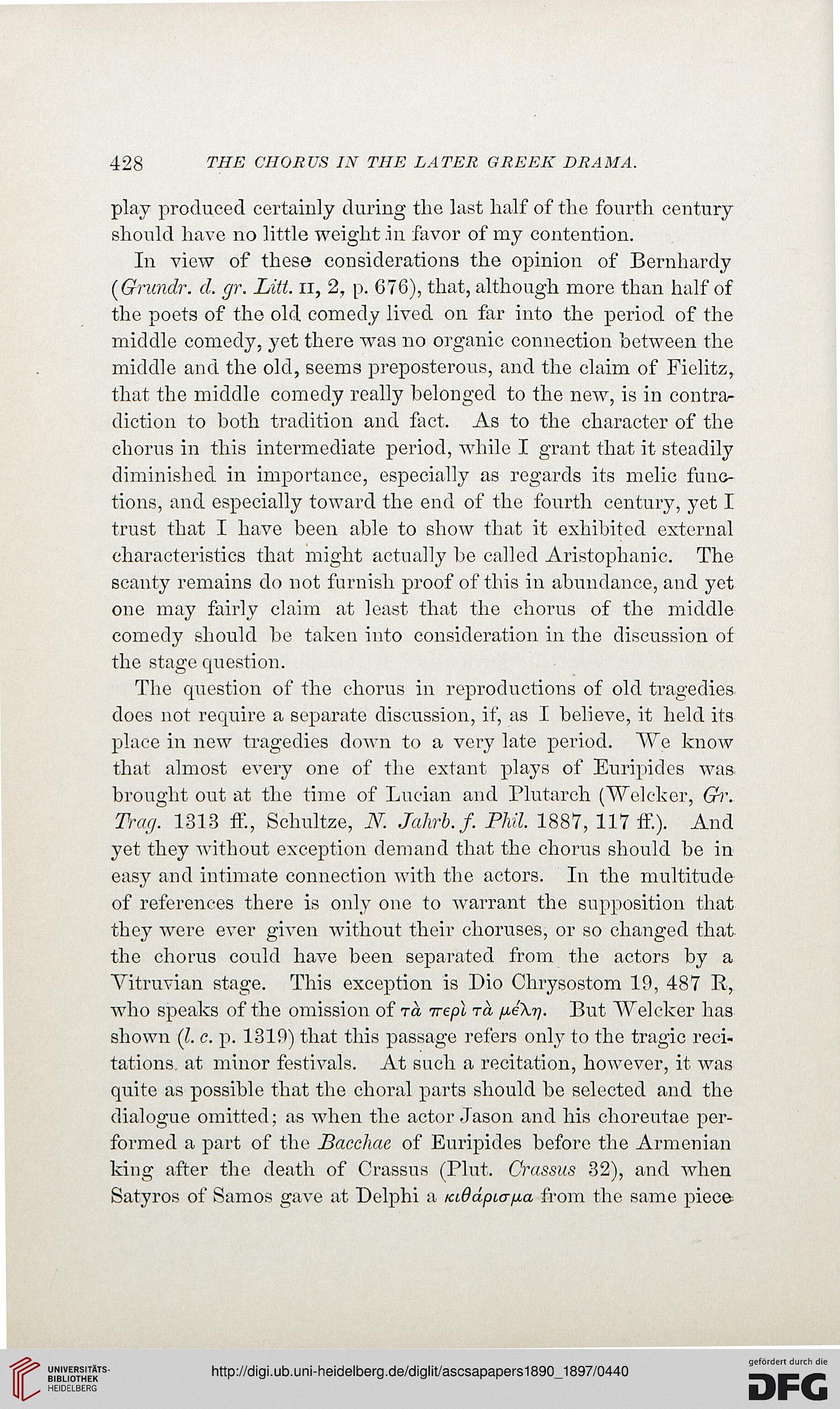428
THE CHORUS IN THE LATER GREEK DRAMA.
play produced certainly during the last half of the fourth century
should have no little weight .in favor of my contention.
In view of these considerations the opinion of Bernhardy
(Grundr. d. gr. Litt. u, 2, p. 676), that, although more than half of
the poets of the old comedy lived on far into the period of the
middle comedy, yet there was no organic connection between the
middle and the old, seems preposterous, and the claim of Fielitz,
that the middle comedy really belonged to the new, is in contra-
diction to both tradition and fact. As to the character of the
chorus in this intermediate period, while I grant that it steadily
diminished in importance, especially as regards its melic func-
tions, and especially toward the end of the fourth century, yet I
trust that I have been able to show that it exhibited external
characteristics that might actually be called Aristophanic. The
scanty remains do not furnish proof of this in abundance, and yet
one may fairly claim at least that the chorus of the middle
comedy should be taken into consideration in the discussion of
the stage question.
The question of the chorus in reproductions of old tragedies
does not require a separate discussion, if, as I believe, it held its
place in new tragedies down to a very late period. We know
that almost every one of the extant plays of Euripides was
brought out at the time of Lucian and Plutarch (Welcker, (jr.
Trag. 1313 ft'., Schultze, N. Jahrb.f. Phil. 1887, 117 tf.). And
yet they without exception demand that the chorus should be in
easy and intimate connection with the actors. In the multitude
of references there is only one to warrant the supposition that
they were ever given without their choruses, or so changed that
the chorus could have been separated from the actors by a
Vitruvian stage. This exception is Dio Chrysostom 19, 487 R,
Avho speaks of the omission of ra Trepl ra fie\rj. But Welcker has
shown (I. c. p. 1319) that this passage refers only to the tragic reci-
tations, at minor festivals. At such a recitation, however, it was
quite as possible that the choral parts should be selected and the
dialogue omitted; as when the actor Jason and his choreutae per-
formed a part of the Bacehae of Euripides before the Armenian
king after the death of Crassus (Plut. Crassus 32), and when
Satyros of Samos gave at Delphi a KiOdpiafxa from the same piece
THE CHORUS IN THE LATER GREEK DRAMA.
play produced certainly during the last half of the fourth century
should have no little weight .in favor of my contention.
In view of these considerations the opinion of Bernhardy
(Grundr. d. gr. Litt. u, 2, p. 676), that, although more than half of
the poets of the old comedy lived on far into the period of the
middle comedy, yet there was no organic connection between the
middle and the old, seems preposterous, and the claim of Fielitz,
that the middle comedy really belonged to the new, is in contra-
diction to both tradition and fact. As to the character of the
chorus in this intermediate period, while I grant that it steadily
diminished in importance, especially as regards its melic func-
tions, and especially toward the end of the fourth century, yet I
trust that I have been able to show that it exhibited external
characteristics that might actually be called Aristophanic. The
scanty remains do not furnish proof of this in abundance, and yet
one may fairly claim at least that the chorus of the middle
comedy should be taken into consideration in the discussion of
the stage question.
The question of the chorus in reproductions of old tragedies
does not require a separate discussion, if, as I believe, it held its
place in new tragedies down to a very late period. We know
that almost every one of the extant plays of Euripides was
brought out at the time of Lucian and Plutarch (Welcker, (jr.
Trag. 1313 ft'., Schultze, N. Jahrb.f. Phil. 1887, 117 tf.). And
yet they without exception demand that the chorus should be in
easy and intimate connection with the actors. In the multitude
of references there is only one to warrant the supposition that
they were ever given without their choruses, or so changed that
the chorus could have been separated from the actors by a
Vitruvian stage. This exception is Dio Chrysostom 19, 487 R,
Avho speaks of the omission of ra Trepl ra fie\rj. But Welcker has
shown (I. c. p. 1319) that this passage refers only to the tragic reci-
tations, at minor festivals. At such a recitation, however, it was
quite as possible that the choral parts should be selected and the
dialogue omitted; as when the actor Jason and his choreutae per-
formed a part of the Bacehae of Euripides before the Armenian
king after the death of Crassus (Plut. Crassus 32), and when
Satyros of Samos gave at Delphi a KiOdpiafxa from the same piece




